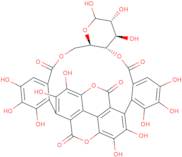Punicalin
CAS: 65995-64-4
Ref. 3D-FP74109
| 2mg | Discontinued | ||
| 5mg | Discontinued | ||
| 10mg | Discontinued | ||
| 25mg | Discontinued | ||
| 50mg | Discontinued | ||
| 100mg | Discontinued |
Product Information
- 2,20,1,23-(Epoxy[2]propene[1,2]diyl[3]ylidene)-11H,15H-tribenzo[g,i,q][1,5,12]trioxacyclononadecin, <span class="text-smallcaps">D</span>-glucose deriv.
- 3,4,5,11,12,13,21,22,23,26,27,38,39-Tridecahydroxy-9,14,17,29,36-Pentaoxaoctacyclo[29.8.0.02,7
- <span class="text-smallcaps">D</span>-Glucose, cyclic 4,6-[(2S,2′S)-2,2′-(5,10-dihydro-2,3,7,8-tetrahydroxy-5,10-dioxo[1]benzopyrano[5,4,3-cde][1]benzopyran-1,6-diyl)bis[3,4,5-trihydroxybenzoate]]
- [1]Benzopyrano[5,4,3-cde][1]benzopyran, <span class="text-smallcaps">D</span>-glucose deriv.
- 2,20,1,23-(Epoxy[2]propene[1,2]diyl[3]ylidene)-11H,15H-tribenzo[g,i,q][1,5,12]trioxacyclononadecin, D-glucose deriv.
- [1]Benzopyrano[5,4,3-cde][1]benzopyran, D-glucose deriv.
- D-Glucose, cyclic 4,6-[(2S,2′S)-2,2′-(5,10-dihydro-2,3,7,8-tetrahydroxy-5,10-dioxo[1]benzopyrano[5,4,3-cde][1]benzopyran-1,6-diyl)bis[3,4,5-trihydroxybenzoate]]
Punicalin is a natural product that has been shown to be a potent anti-inflammatory agent. It has been shown to inhibit the production of cyclin D2, which is associated with the development of atherosclerotic lesions. Punicalin also induces autophagy and inhibits oxidative injury in mouse tumor cells. Punicalin has been shown to have antibacterial efficacy against gram-positive bacteria (e.g., Bacillus subtilis) and gram-negative bacteria (e.g., Escherichia coli). It can also be used for the treatment of infectious diseases such as tuberculosis or bacterial sepsis, which are characterized by high levels of oxidative stress. Punicalin has been shown to have a number of physiological effects, including an increase in liver glycogen content and blood sugar levels, as well as inhibiting gsh-px activities in rat liver cells.





